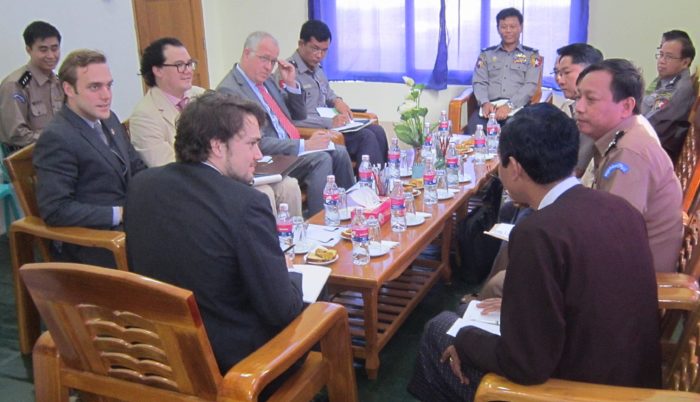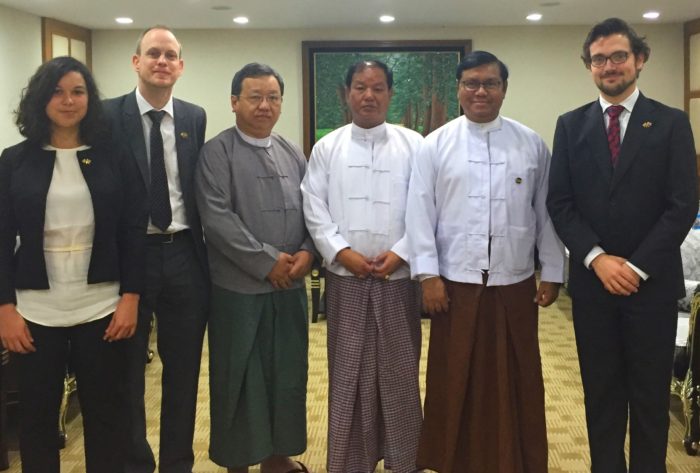17th June 2016
Anti-money laundering in Burma

I am delighted to contribute a post and provide an insight into how a project of ours is addressing an important issue in Burma, where GovRisk has managed Prosperity-funded Anti-Money Laundering projects for the last three years.

At first glance, it might not be clear what preventing money laundering has to do with opening markets and creating the conditions for sustainable economic growth. Why, in a society that is busy reforming and modernising almost every aspect of government and business life, does this topic warrant our attention, fit UK objectives and justify the strategic intervention of a Prosperity-funded project?
The answer has implications for the country’s immediate perception to outsiders, business prospects in the medium term and future balance of economic power and influence.
First, and most obviously, the country has a major international assessment to tackle. The forthcoming Financial Action Task Force (FATF) Mutual Evaluation, for which work has now begun, will examine not only the legal and institutional framework for preventing financial crime, but judge its effectiveness based on statistics and evidence that the country provides – and, according to the assessment methodology, rank adversely where evidence is lacking. So the country must demonstrate a coordinated response across multiple agencies and sectors, commensurate with a National Risk Assessment being undertaken this year, using many brand new legal and regulatory measures[1], which punishes and deters sophisticated crimes to international standards.
If that seems like an onerous schedule for reform, it is arguably in line with the growing risk profile of the country and resulting business concerns. As all economic activity is modernising, so rises the money laundering risk – one that international businesses are keenly aware of, with severe penalties for non-compliance becoming the norm in the major financial centres and the extra-territorial reach of legislation like the UK Bribery Act[2] demanding a business-wide approach. At the first meeting between the Financial Intelligence Unit (FIU) and non-financial regulated sectors which we hosted in early 2015, those representing the legal sector cited money laundering controls as “the top concern for investors”, while at similar meetings in 2014, the financial services sector expressed a need for confidence in these controls in order to develop correspondent banking relationships and develop the sector.
Our work, therefore, has provided expert advice and enhanced capability in a range of areas across government and the regulated sectors, deploying UK and international expertise to build the capacity of the FIU, enhance inter-agency cooperation between the competent authorities, improve the quantity and quality of information available for scrutiny or investigation and establish the basis for regulatory dialogue. The project is a partnership with the Embassy’s Prosperity team, who are actively involved throughout the work, providing practical insight into the nuanced and ever-changing political and economic situation, dramatically enhancing our impact.

We work closely with the UK Financial Services Taskforce, which harnesses the generously-provided expertise of Standard Chartered, Prudential and Allen and Overy to build understanding and expertise in the regulated sectors and we coordinate extensively with international donors and providers such as the US Treasury Office of Technical Assistance, Indonesia’s Financial Intelligence Unit (PPATK), the IMF and the UN Office on Drugs and Crime to ensure a consistent and coherent approach. Due to the sustained nature of our programme, and our coordination with the embassy’s Prosperity Team, we have built up healthy relations with Burma’s Financial Intelligence Unit, who are active participants in the work. There is strong interest in and outside the country that Burma harmonises its approach to money laundering and major economic incentives to do so.
But for Burma, the consequences could be even more profound. Money laundering measures have developed internationally to a level where they (indirectly) impact even the smallest economic activity, from buying a house to changing foreign currency. The measures and environment created in Burma now will define what is deemed normal behaviour for years to come, and punish a range of crimes from tax evasion and corruption to drug trafficking and organised crime. These measures are benefitting from a wealth of international trial-and-error in different settings and, perhaps uniquely, are being implemented before the real economic incentives to pursue these crimes takes effect and bad business practices become entrenched. It is within the country’s grasp to effectively dissuade this behaviour and thereby escape its harm. And it is from that bright future that we hope to look back, proud to have played a part in its achievement.
NOTE: On 24th June, the global Financial Action Taskforce (FATF) announced that Burma has made significant progress in improving its Anti-Money Laundering / Countering the Financing of Terrorism regime and is no longer subject to the FATF monitoring process. This follows over two years of work by the UK organisation GovRisk and Standard Chartered Bank who, with Prosperity Funding and in coordination with the IMF and US Office of Technical Assistance, have been nudging and supporting Burma towards taking more effective action to tackle financial crime.
GovRisk is a specialised provider of technical assistance and expert advice on financial crime prevention and anti-corruption.
[1] The Anti-Money Laundering Law, 2014 (and Rules, 2015), the Combating the Financing of Terrorism provisions, 2015 (and Rules, 2016), the Central Bank’s Customer Due Diligence measures for the financial services sector, 2015 and many others.
[2] Although the UKBA criminalises bribery and corruption, it is money laundering laws and regulations which allow authorities to pursue, restrain and recover criminal funds.
